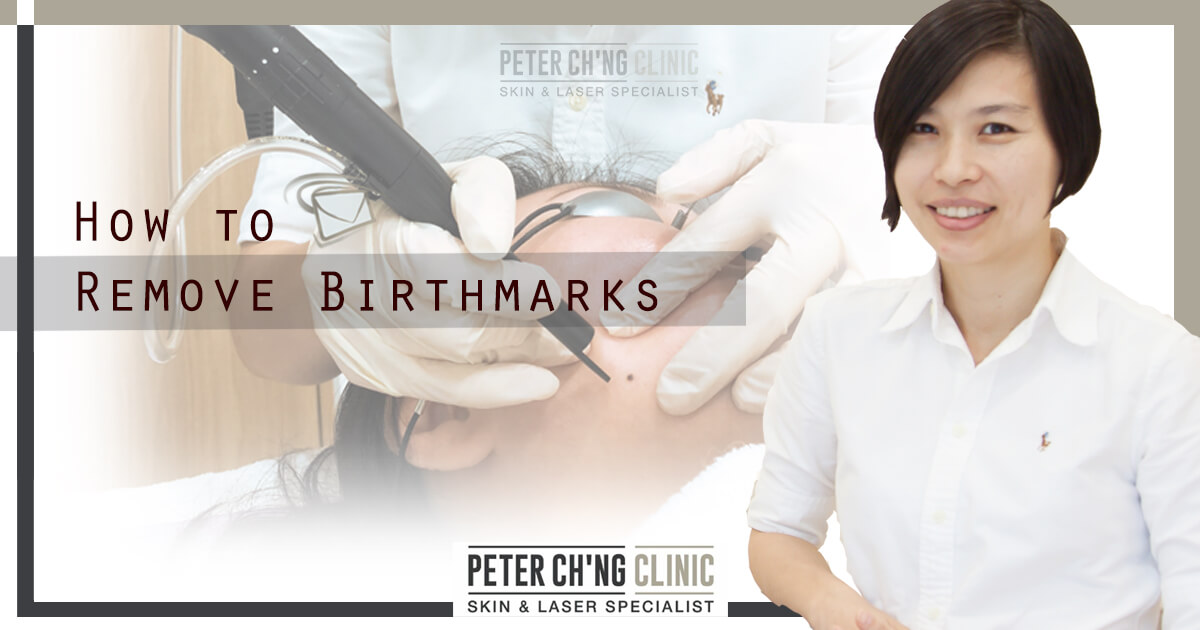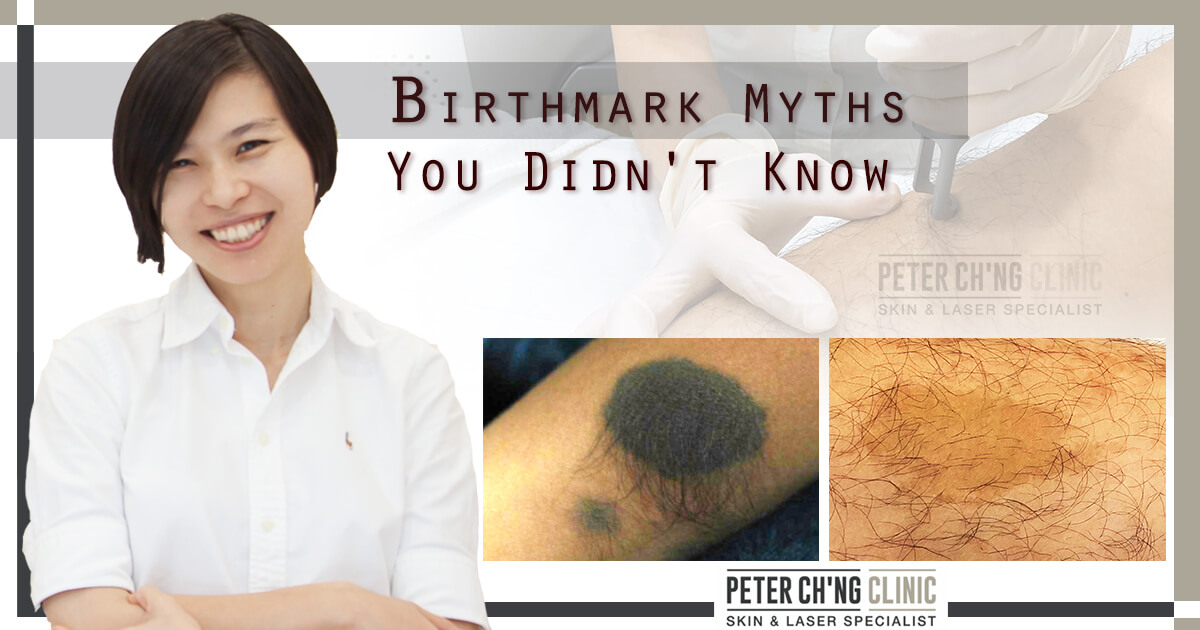Patient Mailbox: Warts on My Face I Always Try to Cover
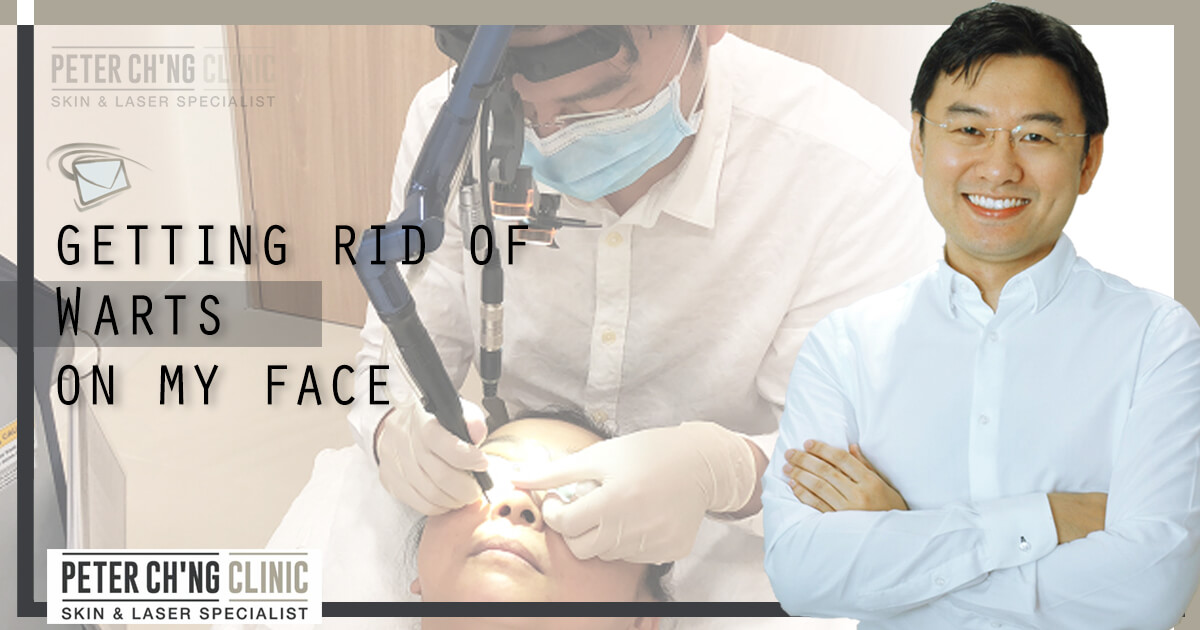
Hello there! How are you doing?
I'm Dr Peter Ch'ng and here's Episode 6 of our Patient Mailbox series. We collect handpicked questions submitted by patients suffering from various skin diseases and condition, and personally answer them with our best efforts. I hope to help any one of you who face challenges from similar situations.
Editor’s Note: Dr Peter Ch’ng is a Consultant Dermatologist actively involved in numerous talks and workshops, and is an esteemed contributor to dermatology research and publishing internationally. He practices at both Dr Peter Ch'ng Skin Specialist Clinic in Desa Park City and Gleneagles Hospital Kuala Lumpur.
Question:
Hi Dr Peter, I’m Sarah, 29 this year. I have these warts on my face beside my left eye, they’ve been there for more than a year now. I thought that they would disappear but they didn’t.
Even though they’re harmless, I always have to cover them up with my hair - I look the same in all my photographs because of this!
Even though I’ve heard of people trying to remove these warts on their own, I’m afraid of hurting myself or making it worse.
How can I treat these warts? I’m tired of having my hair cover my eye!
Answer:
You need not cover your warts with your hair or head decorations - because there are indeed medical treatments to get rid of warts - quickly and effectively.
Before we go through the treatments, I'll briefly explain why warts are formed, and the different types of warts.
Warts can be seborrhoeic warts (benign skin growths due to genetics and aging), or viral warts (caused by virus).
If it is a viral wart, it can be infectious due to the Human Papilloma Virus (HPV). In this case, a person may get infected by the virus through touching, including skin to skin contact or by simply touching an object that has been previously touched by someone who has HPV.
Sometimes warts can be mistaken for skin cancer as well, but most of the time we can differentiate them clinically. Through an examination using a dermatoscope to examine the lesion, any skin warts that are being suspected for skin cancer should be followed with an immediate skin biopsy to check and act on any potential risk.
Seborrhoeic warts (Seborrhoeic keratosis)
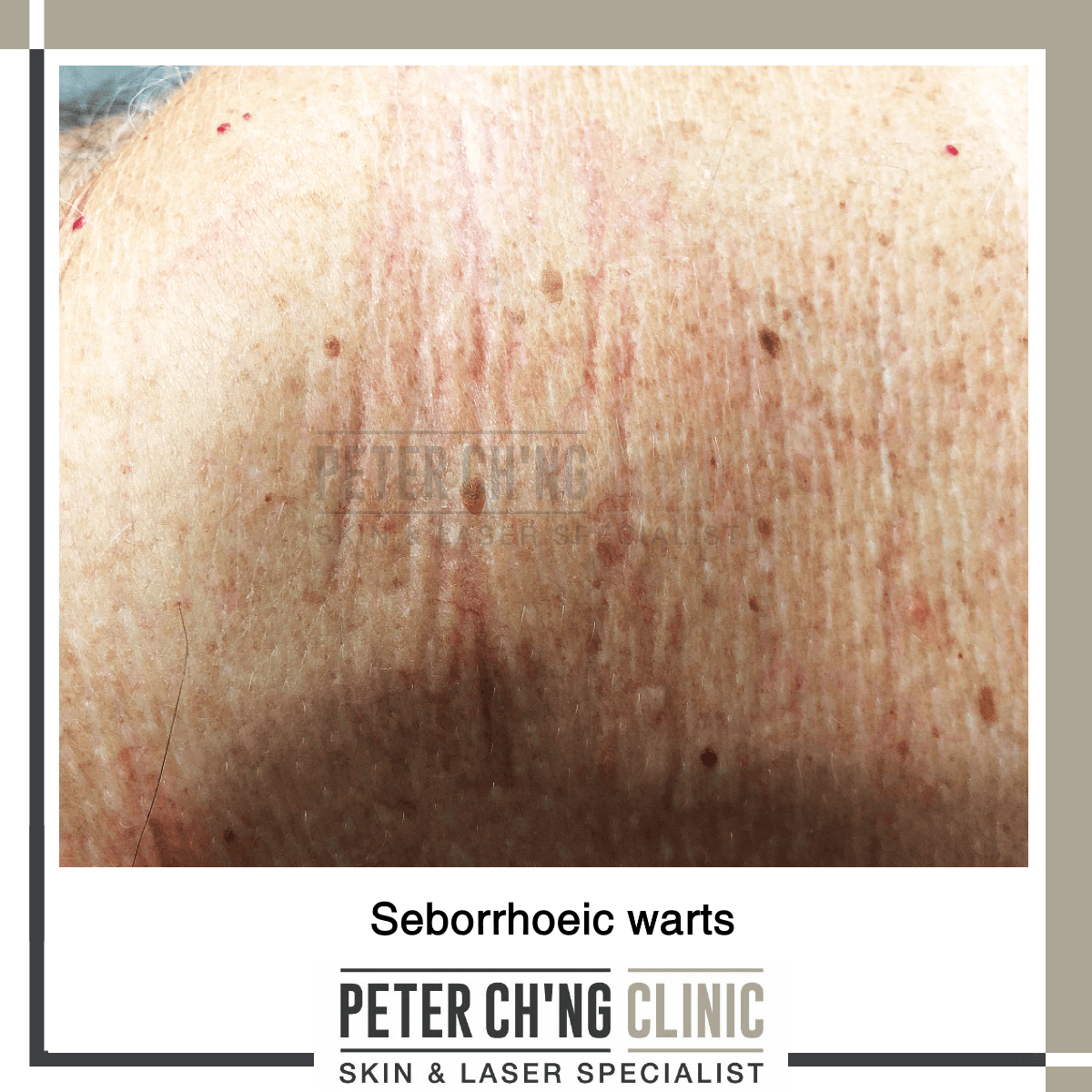
Seborrhoeic warts, known medically as seborrhoeic keratosis, are benign growths on our skin made up of a build-up of skin cells. They look like small dabs of wax protruding out on the skin surface, and can be black, brown or white in colour.
Seborrhoeic warts are common in the process of skin agine. Some people will have one or two of these warts, while others can have these warts in large numbers.
Seborrhoeic warts are usually harmless and don't develop into skin cancer.
Plantar warts
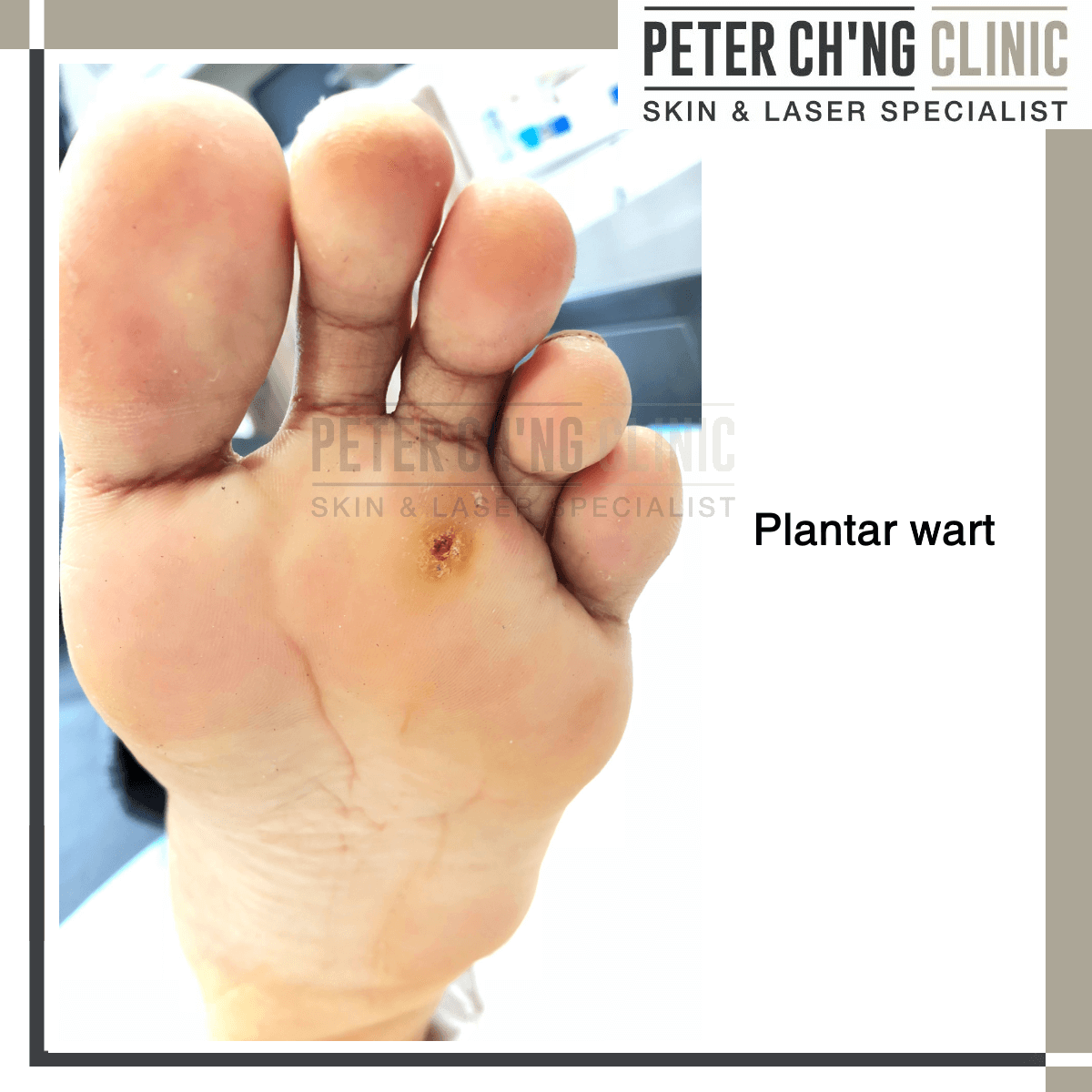
Plantar warts, a viral wart, are the common small growths that you find on your feet, usually around your heels or front foot areas.
Plantar warts look like hard, thickened skin forming a lesion on the bottom of your foot around the base of your toes, your front foot, or on your heels. Sometimes, these warts can cause some pain and discomfort when walking or standing.
Plantar warts are caused by HPV. The HPV virus usuall enters your body through tiny openings (caused by cuts or breaks) under your feet.
Keratoacanthoma (benign skin tumour)
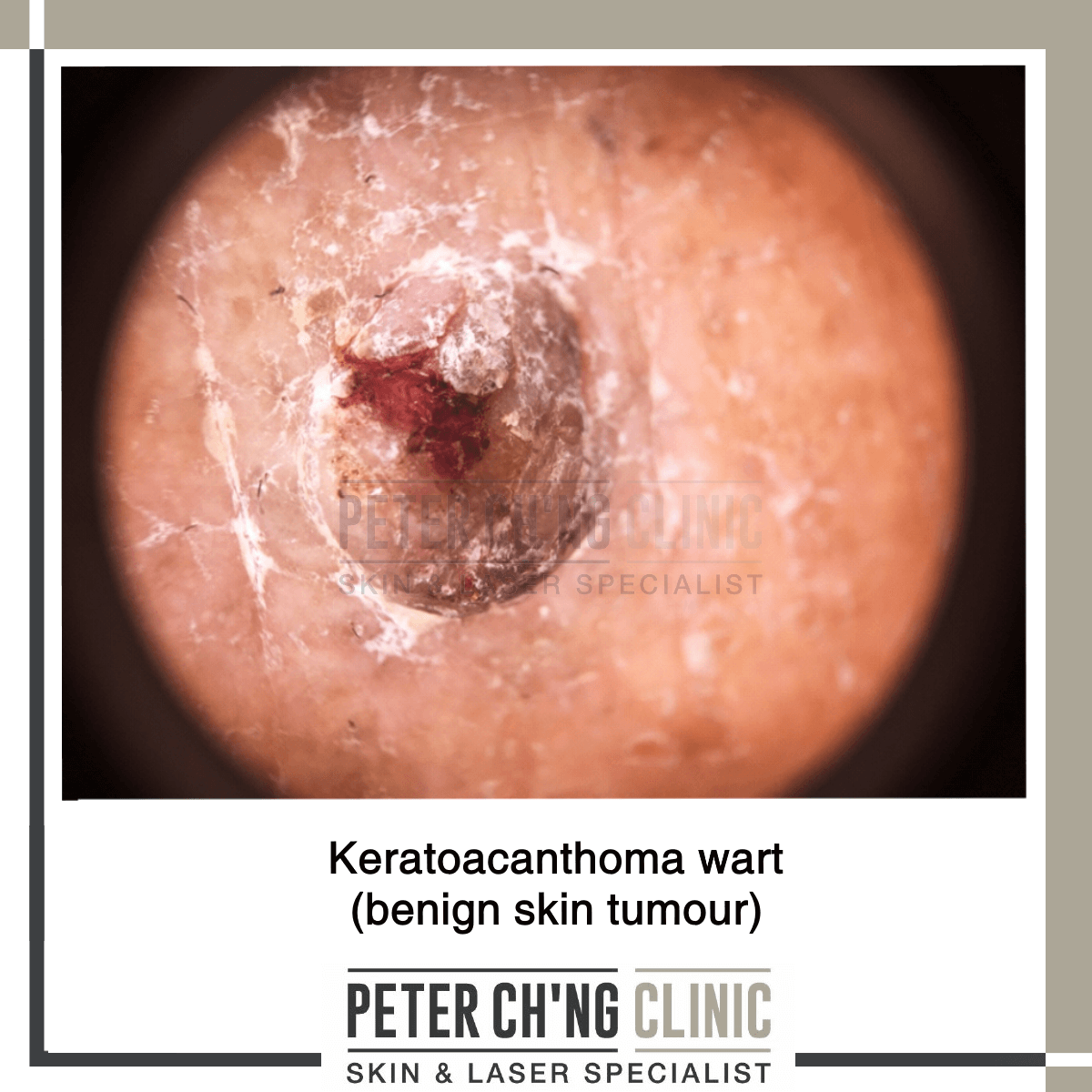
Keratoacanthoma is a benign skin tumour that looks like a dome-shaped lump usually small and red in colour. Keratocanthoma can appear on the part of your skin that is frequently exposed to the sun, like your head, neck and arms.
It is possible for these benign skin tumour to be a symptom of skin cancer, so if you spot one, get a medical consultation as soon as possible.
Squamous cell carcinoma (malignant skin tumour)
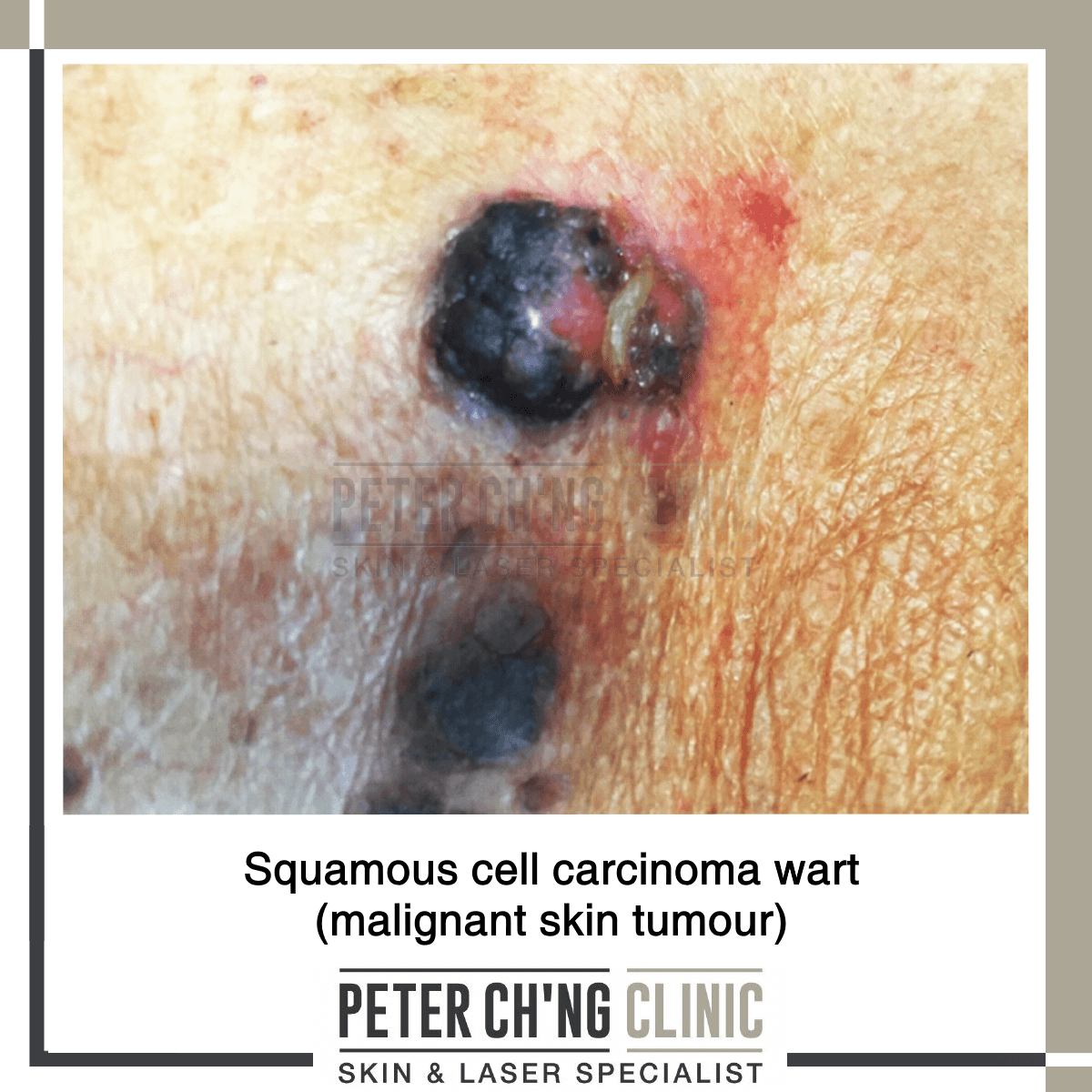
Squamous cell carcinoma is a very common form of skin cancer. It looks like a red colour bump on a scaly patch on your skin. If you scratch these warts, your skin can bleed easily.
Squamous cell carcinoma is usually found on areas of the skin constantly damaged by sunlight and ultraviolet rays. These include the skin on our head, neck, ears, lips, arms, legs, and our heads.
It is important to spot and start treating squamous cell carcinoma early, so get a medical consultation immediately if you are suspicious of having one.
Alright, so coming back to answering the main question - how exactly can we treat these warts?
Co2 Laser Treatment
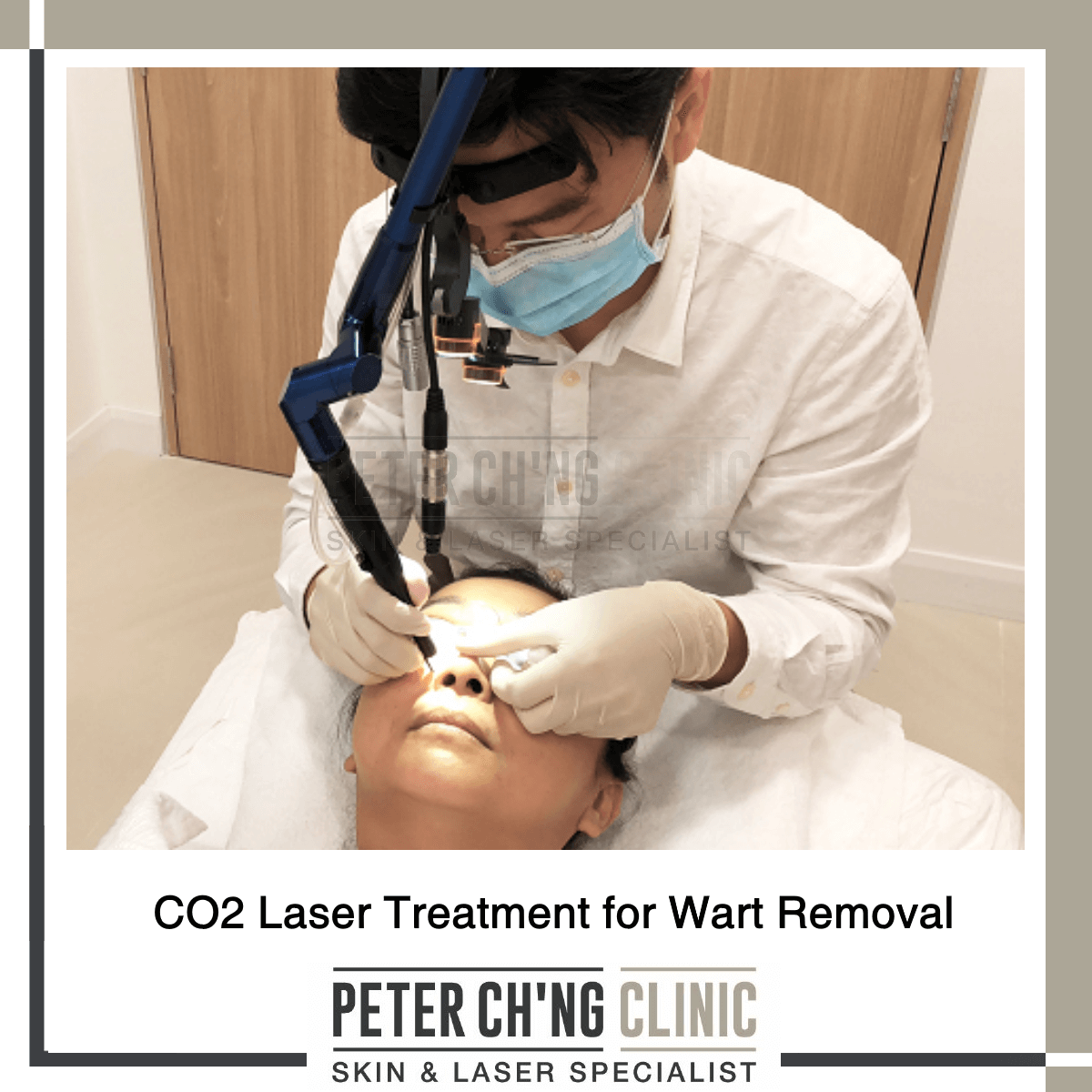
A laser treatment will be able to target the treatment area accurately. The most common laser used to treat viral warts is Carbon Dioxide (Co2) Laser.
Co2 laser emits a beam of laser light. This light is absorbed into our skin, and the heat damage from the laser destroys the skin cells causing the warts.
This is a very quick and effective way to remove warts.
*Editor’s note: Laser treatments are quick and effective treatments for warts. If you’re interested in getting one, call us at +6011-22882299, WhatsApp us here, or book an appointment with Dr Peter here!
Electrocautery Treatment
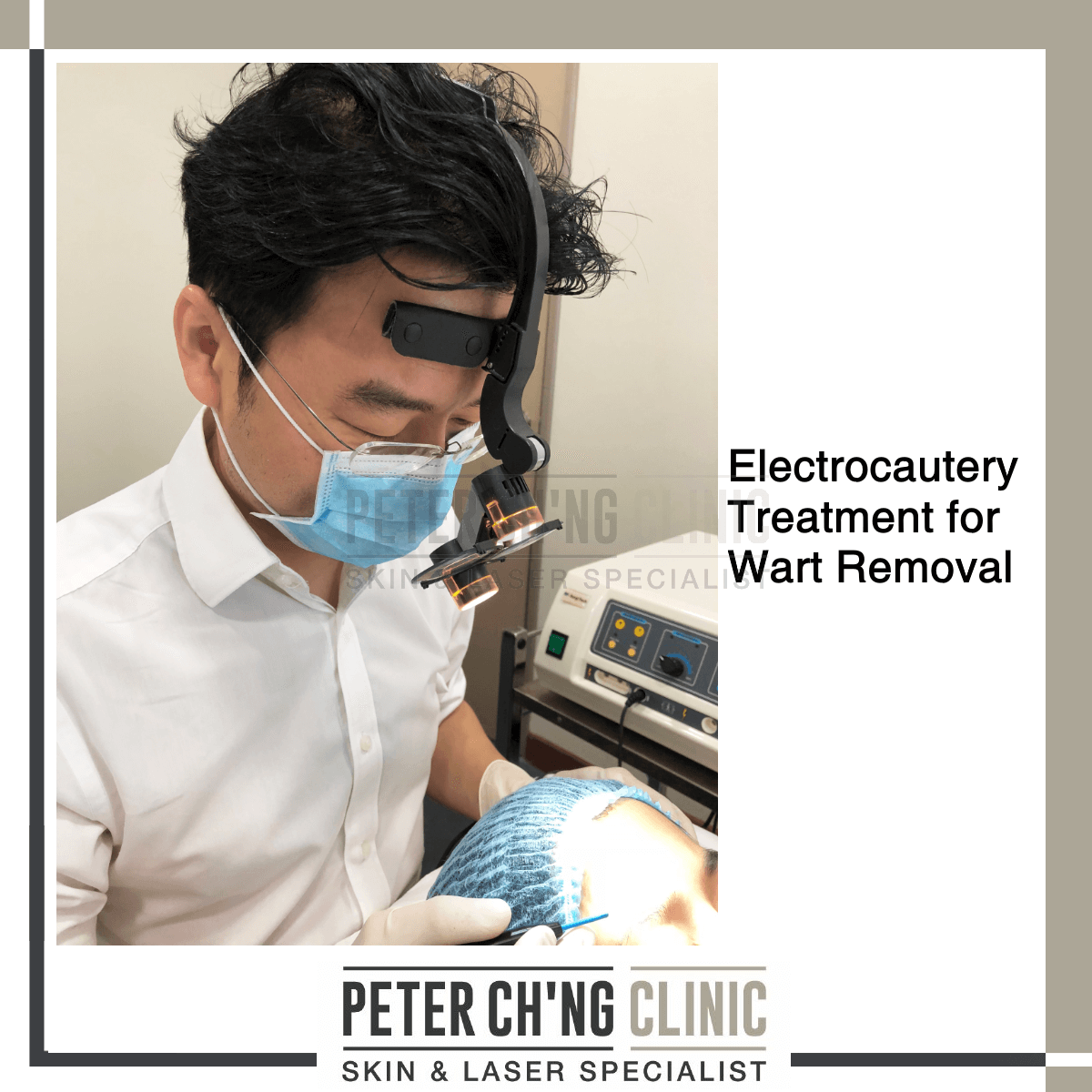
An electrocautery is the process where current is passed through to generate heat and treat the warts on our skin. This heat is passed through to a needle which is put to the wart.
Electrocautery is one of the treatments where the warts are less likely to re-appear after the treatment. It is a common treatment used for genital warts especially.
*Editor’s note: Dr Peter has ample experiences in using electrocautery to treat warts. If you’re interested in getting an electrocautery treatment for your warts, call us at +6011-22882299, WhatsApp us here, or book an appointment with Dr Peter here!
Cryotherapy
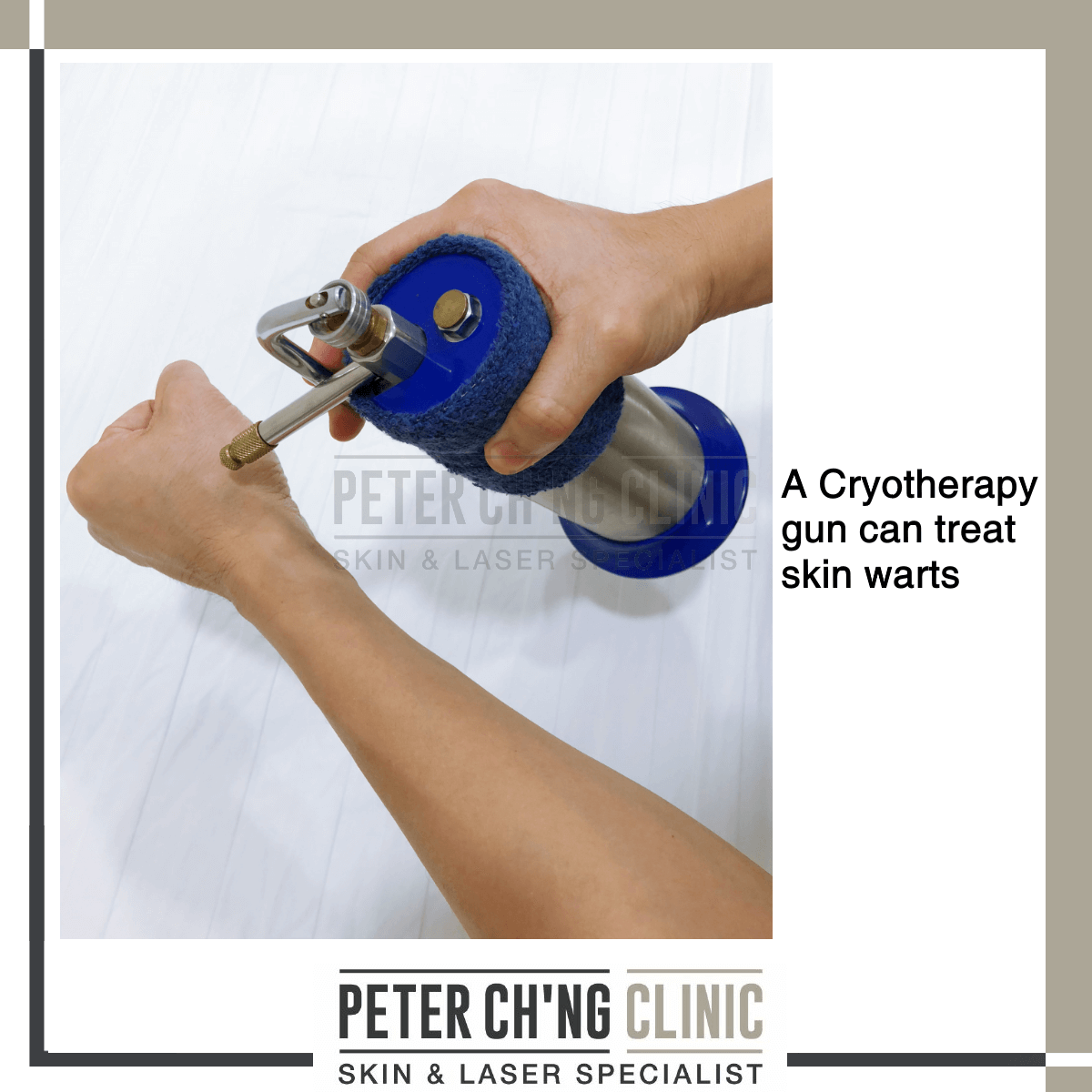
Cryotherapy is the treatment to remove warts through freezing them off using liquid nitrogen. Using a cryotherapy gun, the frozen warts will form blisters and eventually fall off.
Cryotherapy is a recommended treatment choice for plantar warts on the feet, as it can penetrate deep into the skin without causing any scarring at the sole of our feet because the skin there is very thick.
However, when treating warts on the face, it can be difficult to estimate the depths of the treatment, and sometimes it may cause scarring and post-inflammatory hypopigmentation. So cryotherapy may not be your best choice for treating the warts on your face.
A verdict on wart self-removal
Removing warts on your own without any medical treatments is also commonly spoken about, but definitely not encouraged.
I have also heard patients ask about these home remedies they find online or heard from people around them. Among these, using oil to treat warts will definitely not work.
Using acid to pick these warts may work, even if you use fire to burn the warts, they can fall off. I have seen people in the markets offering services using acid to dot on skin warts or lumps.
But we have to know the important differences between these self-made treatments and medical treatments:
1. The diagnosis may not be accurate
If you dot acid on a cancerous cell (which is a possibility for warts), the cells will indeed disappear, but they will come back with a vengeance, and possibly spread to other parts of our skin.
2. The treatment may not be accurate
Using acid, we cannot control how much or how accurate we are when treating these warts.
If we use a strong acid, the damage on our skin will be much deeper and wider than the actual wart itself.
And when we press hard to let the acid penetrate the wart, the acid will go deeper and wider into our skin. No matter how we do it, it will never be as fine a treatment as when using a laser beam.
If we use a laser treatment, we can be very precise and accurate. No matter how small the lesion on the skin is, we can target the specific wart, and can also determine the depths of which the laser should focus on.
This produces a quick, effective, and safe treatment for warts.
So do be wise in deciding how to treat or get rid of the warts on your skin, I hope that my advice can help you in doing just that. But remember - you do not have to cover these warts or have them affect your appearance and comfort. Treatments are always available for you to get rid of them!
Look out for next weeks entry as we elaborate more on why you shouldn't try to remove warts on your own!
Cheers.
*Editor’s note: As an esteemed dermatologist and skin specialist, Dr Peter prides himself in being able to treat acne patients of all types, with a 100% acne treatment success record. If you’d like to ask more about acne or have a discussion with Dr Peter, you can contact us at +6011-22882299, Whatsapp us here, or book an appointment with Dr Peter here!

If you’d like to ask more about your skin condition or have a discussion with Dr Peter, you can contact us at +6011-22882299, Whatsapp us, or book an appointment with Dr Peter here!
Treatments mentioned in this article :
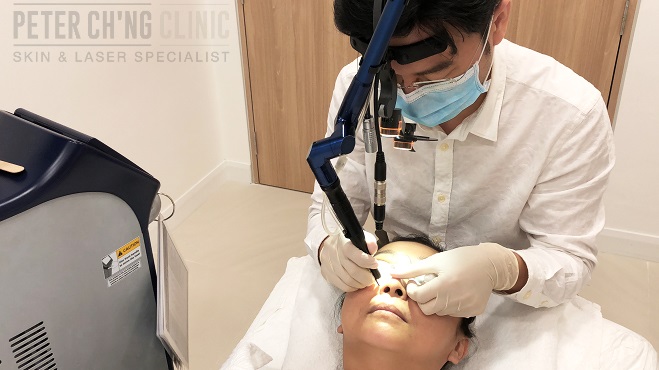
Treatment for Warts & Skin Tags
Warts or skin tags can be benign growths or caused by virus and infection. There are different types of treatments that will be able to target the treatment area accurately.
